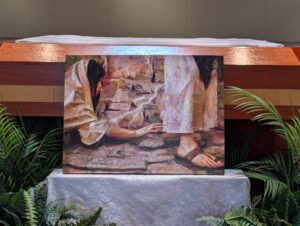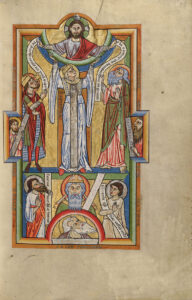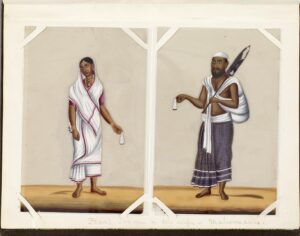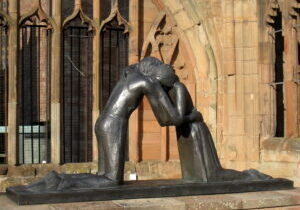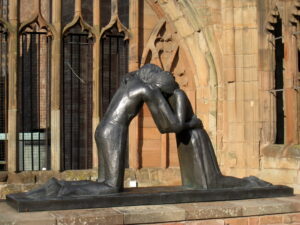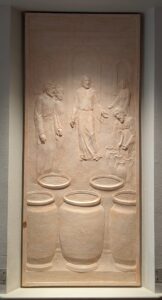Finding the Way – Got a Map?
 Spatial orientation and keeping track of landmarks, finding the way, while moving from one place to another do not always come naturally, especially when an individual has always been with someone else who has led the way for them. I discovered this to my surprise one day when I went with three guys from my high school class to take part in a program for students from all over town at one of the local colleges. None of us had ever visited that particular campus, so no one knew where we were going.
Spatial orientation and keeping track of landmarks, finding the way, while moving from one place to another do not always come naturally, especially when an individual has always been with someone else who has led the way for them. I discovered this to my surprise one day when I went with three guys from my high school class to take part in a program for students from all over town at one of the local colleges. None of us had ever visited that particular campus, so no one knew where we were going.
We managed to find our way to the classroom where the event was to occur and had a good time with the other students. Then it was time to go back to our own campus and return home from there. When we left the building, I assumed all of the others would know the way back to the car in which we had come, but as it turned out, none of the guys remembered which way to go! I was amazed. My father had made sure all of us learned at an early age to pay attention to landmarks and which way we had turned when hiking in the countryside or walking in town. But apparently, the guys had not been so lucky. I led the way back to the car and we made it home safely. (They were all taken aback that a girl could find the way home, by the way. It was a different time!)
The question of finding the way, however, is not always something as simple as finding one’s way across a small college campus in a city. It’s not even merely a physical feat of geolocation – where am I physically? Finding the way may be a factor in achieving a personal goal – I will learn how to knit this scarf! It might also be something life-changing – what am I called to do with my life? What is my vocation to be? How will I know what God is calling me to do? Got a map?
In each of the readings this Twenty-third Sunday in Ordinary Time, the question of searching for and finding the way or of reaching a goal is part of the story.
Jesus spoke to great crowds of people who followed him through the countryside from village to village and city to city. His words sound harsh to us today. “If anyone comes to me without hating his father and mother, and even his own life, he cannot be my disciple.” How can hating anyone be a goal for the follower of Jesus. Aren’t we supposed to love everyone?
This is a situation in which words in one language do not necessarily mean the same thing as in another. In some languages, there are no words to express concepts found and expressed in another. This is the case with the use of the word “hate” here. There was not a word in Jesus’ language to express preference corresponding to the word “like.” Our usage of “like” as in “prefer” was not a possibility in his language. To say that something is not to be preferred, the word translated as hate in English was used.
So, Jesus is telling his followers that if family traditions or claims on their allegiance from their family would stop them from following the way of living to which he calls his followers, their choice would need to be to prefer Jesus’ way and leave behind the claims of others – to “hate” those claims.
He gives examples of situations in which people make choices in their lives. Do I have the resources to build a tower (add on a room to my house)? Should I settle with an adversary or press my claim legally or on a battlefield? What am I willing to give up to follow this new way of love that Jesus teaches? (Lk 14:25-33)
Where is the map? How will I find the way?
Paul wrote to his friend Philemon from jail near the end of his life. One of Philemon’s slaves had come to stay with Paul and become a Christian. Paul was not required to return Onesimus to Philemon. In fact, Jewish law prohibited the return of a slave to a master. (Deut 23:16) Nevertheless, Paul sent Onesimus back to Philemon with a letter and request – receive him back into your home as a beloved brother in Christ rather than as a slave. “If you regard me as a partner, welcome him as you would me.” (Phil 9-10, 12-17)
This is definitely not the normal map! There’s a new one coming into focus.
How do we find the new map? How will we know where to go, which way to turn as we journey through life?
The author of the book of Wisdom rightly asks, “Who can know God’s counsel, or who can conceive what the Lord intends?” Humans can’t really know. Our bodies are weak, our dreams are limited, our plans are uncertain. Knowledge of how things work and what is right or good in earthly terms is not easy to achieve. We try again and again to understand the physical world and still seem only to glimpse a small part of the bigger picture.
How can humans, with such limited ability to see and understand reality, ever hope to understand the ways of the Lord and the heavenly realm? The answer is clearly stated: “…who ever knew your counsel, except you had given wisdom and sent your holy spirit from on high? And thus were the paths of those on earth made straight.” (Wis 9:13-18b)
Here is the map. The Holy Spirit instructs those who seek wisdom and understanding of the Lord’s ways. The Spirit is our hope, our refuge, our guide.
We too must rely on the Holy Spirit to guide us through each day, keeping our eyes open to see the landmarks as we move along the twists and turns of daily life. Who will we meet on the way to work? What will a fellow student need to hear as reassurance or friendship from us? Is there someone at the grocery store who could use a smile or a bit of patience from the rest of the people in line? What child walking along the sidewalk with parents will be delighted to discover that you too have pockets in your coat?
Most of us don’t have the power to reach out and fix the injustices of national or international policy around us today. But we do have the power to work for justice in our own communities. We can make a difference for the people among whom we live and work. We can help protect our neighbors and co-workers who may be in danger from those who have been led to fear them. We can share our resources and knowledge of the ways our laws and traditions work with those who have relatively newly arrived. We can be kind to all we meet.
The law of the Lord is love. This week may we use Love as our primary map as we find our way through our daily activities on the way to the blossoming of the kingdom of Love, the kingdom of God.
Readings for the Twenty-third Sunday in Ordinary Time – Cycle C
Read More







